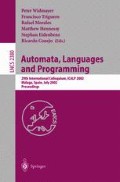Abstract
We present a simple strongly universal innocent game model for Levy-Longo trees i.e. every point in the model is the denotation of a unique Levy-Longo tree. The observational quotient of the model then gives a universal, and hence fully abstract, model of the pure Lazy Lambda Calculus.
Access this chapter
Tax calculation will be finalised at checkout
Purchases are for personal use only
Preview
Unable to display preview. Download preview PDF.
References
S. Abramsky, R. Jagadeesan, and P. Malacaria. Full abstraction for PCF. Information and Computation, 163, 2000.
S. Abramsky and G. McCusker. Games and full abstraction for the Lazy Lambda Calculus. In Proc. LICS, pages 234–243. The Computer Society, 1995.
S. Abramsky and C.-H. L. Ong. Full abstraction in the Lazy Lambda Calculus. Information and Computation, 105:159–267, 1993.
H. Barendregt. The Lambda Calculus. North-Holland, revised edition, 1984.
V. Danos and R. Harmer. The anatomy of innocence. In Proc. CSL 2001, pages 188–202. Springer Verlag, 2001. LNCS Vol. 2142.
P. Di Gianantonio. Game semantics for the Pure Lazy Lambda Calculus. In Proc. TLCA 2001, pages 106–120. Springer-Verlag, 2001.
P. Di Gianantonio, G. Franco, and F. Honsell. Game semantics for the untyped λβη-calculus. In Proc. TLCA 1999, pages 114–128. Springer-Verlag, 1999. LNCS Vol. 1591.
J. M. E. Hyland and C.-H. L. Ong. On Full Abstraction for PCF: I. Models, observables and the full abstraction problem, II. Dialogue games and innocent strategies, III. A fully abstract and universal game model. Information and Computation, 163:285–408, 2000.
A. D. Ker, H. Nickau, and C.-H. L. Ong. A universal innocent game model for the Böhm tree lambda theory. In Proc. CSL 1999, pages 405–419. Springer-Verlag, 1999. LNCS Volume 1683.
A. D. Ker, H. Nickau, and C.-H. L. Ong. Innocent game models of untyped λ-calculus. Theoretical Computer Science, 272:247–292, 2002.
J.-J. Levy. An algebraic interpretation of equality in some models of the lambda calculus. In C. Böhm, editor, Lambda Calculus and Computer Science Theory, pages 147–165. Springer-Verlag, 1975. LNCS No. 37.
G. Longo. Set-theoretical models of lambda calculus: Theories, expansions and isomorphisms. Annals of Pure and Applied Logic, 24:153–188, 1983.
G. McCusker. Full abstraction by translation. In Advances in Theory and Formal Methods of Computing. IC Press, 1996.
G. McCusker. Games for recursive types. BCS Distinguished Dissertation. Cambridge University Press, 1998.
G. D. Plotkin. Call-by-name, call-by-value and the lambda calculus. Theoretical Computer Science, 1:125–159, 1975.
Author information
Authors and Affiliations
Editor information
Editors and Affiliations
Rights and permissions
Copyright information
© 2002 Springer-Verlag Berlin Heidelberg
About this paper
Cite this paper
Ong, C.H.L., Di Gianantonio, P. (2002). Games Characterizing Levy-Longo Trees. In: Widmayer, P., Eidenbenz, S., Triguero, F., Morales, R., Conejo, R., Hennessy, M. (eds) Automata, Languages and Programming. ICALP 2002. Lecture Notes in Computer Science, vol 2380. Springer, Berlin, Heidelberg. https://doi.org/10.1007/3-540-45465-9_41
Download citation
DOI: https://doi.org/10.1007/3-540-45465-9_41
Published:
Publisher Name: Springer, Berlin, Heidelberg
Print ISBN: 978-3-540-43864-9
Online ISBN: 978-3-540-45465-6
eBook Packages: Springer Book Archive

